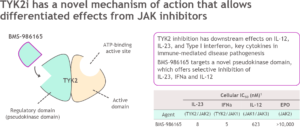Highlights:
- Bristol Myers Squibb’s Sotyktu, a first-in-class, oral, selective, allosteric tyrosine kinase 2 (TYK2) inhibitor, is the only approved TYK2 inhibitor worldwide and the first innovation in oral treatment for moderate-to-severe plaque psoriasis in nearly 10 years
- Pivotal Phase 3 POETYK PSO clinical trials demonstrated superior efficacy of once-daily Sotyktu over placebo and twice-daily Otezla® (apremilast) in improving skin clearance
- Sotyktu has a well-demonstrated safety and tolerability profile based on the POETYK PSO clinical trials
BSQ today announced that the U.S. Food and Drug Administration (FDA) approved Sotyktu™(deucravacitinib), a first-in-class, oral, selective, allosteric tyrosine kinase 2 (TYK2) inhibitor, for the treatment of adults with moderate-to-severe plaque psoriasis who are candidates for systemic therapy or phototherapy.Sotyktu is not recommended for use in combination with other potent immunosuppressants.
The approval is based on results from the pivotal Phase 3 POETYK PSO-1 and POETYK PSO-2 clinical trials, which demonstrated superior efficacy of once-daily Sotyktu compared to placebo and twice-daily Otezla® (apremilast) in 1,684 patients aged 18 years and older with moderate-to-severe plaque psoriasis.1 The superior efficacy of Sotyktu compared to placebo and Otezla was demonstrated at both 16 and 24 weeks, and responses with Sotyktu persisted through 52 weeks. See below for more information.
About Sotyktu

Deucravacitinib Structure
- API– Deucravacitinib
- Description: Deucravacitinib is a novel oral selective tyrosine kinase 2 (TYK2) inhibitor. Unlike other Janus kinase 1/2/3 inhibitors that bind to the conserved active domain of these non-receptor tyrosine kinases, deucravacitinib binds to the regulatory domain of TYK2 with high selectivity to this therapeutic target. This selectivity towards TYK2 may lead to an improved safety profile of deucravacitinib, as nonselective JAK inhibitors are associated with a range of adverse effects such as altered cholesterol and triglyceride levels, and liver and kidney dysfunction
- CAS number -1609392-27-9
- IUPAC Name-6-cyclopropaneamido-4-{[2-methoxy-3-(1-methyl-1H-1,2,4-triazol-3-yl)phenyl]amino}-N-(2H3)methylpyridazine-3-carboxamide
- Mechanism of Action-TYK2 kinase inhibitors

Sotyktu MOA
- Indication -SOTYKTU™ (deucravacitinib) is indicated for the treatment of moderate-to-severe plaque psoriasis in adults who are candidates for systemic therapy or phototherapy.
- Limitations of Use -SOTYKTU is not recommended for use in combination with other potent immunosuppressants.
IMPORTANT SAFETY INFORMATION
CONTRAINDICATIONS
SOTYKTU is contraindicated in patients with a history of hypersensitivity reaction to deucravacitinib or to any of the excipients in SOTYKTU.
WARNINGS AND PRECAUTIONS
Hypersensitivity: Hypersensitivity reactions such as angioedema have been reported. If a clinically significant hypersensitivity reaction occurs, institute appropriate therapy and discontinue SOTYKTU.
Infections: SOTYKTU may increase the risk of infections. Serious infections have been reported in patients with psoriasis who received SOTYKTU. The most common serious infections reported with SOTYKTU included pneumonia and COVID-19. Avoid use of SOTYKTU in patients with an active or serious infection. Consider the risks and benefits of treatment prior to initiating SOTYKTU in patients:
- with chronic or recurrent infection
- who have been exposed to tuberculosis
- with a history of a serious or an opportunistic infection
- with underlying conditions that may predispose them to infection.
Closely monitor patients for the development of signs and symptoms of infection during and after treatment. A patient who develops a new infection during treatment should undergo prompt and complete diagnostic testing, have appropriate antimicrobial therapy initiated and be closely monitored. Interrupt SOTYKTU if a patient develops a serious infection. Do not resume SOTYKTU until the infection resolves or is adequately treated.
ADVERSE REACTIONS
Most common adverse reactions (≥1% of patients on SOTYKTU and more frequently than with placebo) include upper respiratory infections, blood creatine phosphokinase increased, herpes simplex, mouth ulcers, folliculitis and acne.
SPECIFIC POPULATIONS
Pregnancy: Available data from case reports on SOTYKTU use during pregnancy are insufficient to evaluate a drug-associated risk of major birth defects, miscarriage, or adverse maternal or fetal outcomes. Report pregnancies to the Bristol-Myers Squibb Company’s Adverse Event reporting line at 1-800-721-5072.
Lactation: There are no data on the presence of SOTYKTU in human milk, the effects on the breastfed infant, or the effects on milk production. SOTYKTU is present in rat milk. When a drug is present in animal milk, it is likely that the drug will be present in human milk. The developmental and health benefits of breastfeeding should be considered along with the mother’s clinical need for SOTYKTU and any potential adverse effects on the breastfed infant from SOTYKTU or from the underlying maternal condition.
Hepatic Impairment: SOTYKTU is not recommended for use in patients with severe hepatic impairment.
SOTYKTU is available in 6 mg tablets.
“Sotyktu has the potential to become the new standard of care oral treatment for people with moderate-to-severe plaque psoriasis, given its profile in helping patients achieve clearer skin as demonstrated in the POETYK PSO clinical program,” said April Armstrong, MD, MPH, clinical investigator in the POETYK PSO-1 trial and Associate Dean and Professor of Dermatology at the University of Southern California. “People living with moderate-to-severe plaque psoriasis face significant burdens, and Sotyktu is a welcome first-line systemic treatment option.”
Psoriasis is a widely prevalent, chronic, systemic immune-mediated disease that affects approximately 7.5 million people in the U.S. Up to 90 percent of patients with psoriasis have plaque psoriasis, which is characterized by distinct, round or oval plaques typically covered by silvery white scales. Nearly one-quarter of people with psoriasis, or around two million in the U.S., have cases that are considered moderate-to-severe.
“The approval of Sotyktu represents an exciting day for patients suffering from moderate-to-severe plaque psoriasis who are not satisfied with topical and conventional treatments. This is another extraordinary achievement for Bristol Myers Squibb, as we bring forward a new mechanism of action, the first oral treatment approved in nearly 10 years, and the first orally dosed once-daily treatment for moderate-to-severe plaque psoriasis,” said Samit Hirawat, MD, Chief Medical Officer, Bristol Myers Squibb. “We believe Sotyktu is a breakthrough in the treatment of patients with this condition, and we’re excited about its potential in other immune-mediated diseases.”
In the POETYK PSO trials, at Week 16, the most common adverse reactions (≥1 percent and higher than placebo) in patients on Sotyktu were upper respiratory infections (19.2 percent), blood creatine phosphokinase increase (2.7 percent), herpes simplex (2.0 percent), mouth ulcers (1.9 percent), folliculitis (1.7 percent) and acne (1.4 percent).In addition, 2.4 percent of patients on Sotyktu, 3.8 percent of patients on placebo, and 5.2 percent of patients on Otezla experienced adverse reactions leading to discontinuation.
“Despite the availability of therapies, many people living with plaque psoriasis in the United States are untreated or undertreated, said Leah M. Howard, JD, President and CEO of the National Psoriasis Foundation. “The FDA approval of a new oral treatment is exciting news for the psoriasis community. We welcome this new treatment option.”
About POETYK PSO-1 and POETYK PSO-2
The pivotal Phase 3 POETYK PSO-1 and POETYK PSO-2 clinical trials evaluated the safety and efficacy of Sotyktu (6 mg once daily) compared to placebo and Otezla® (apremilast) (30 mg twice daily) in patients with moderate-to-severe plaque psoriasis. Both were multi-national, multi-center, randomized, double-blind, placebo- and active comparator-controlled 52-week Phase 3 studies. POETYK PSO-2 included a randomized withdrawal and retreatment period after Week 24. In total, 664 patients were enrolled in POETYK PSO-1 and 1,020 patients were enrolled in POETYK PSO-2. All participants had moderate-to-severe plaque psoriasis and were candidates for phototherapy or systemic therapy. Patients had a body surface area involvement of ≥10 percent, a Psoriasis Area and Severity Index (PASI) score ≥12, and a static Physician’s Global Assessment (sPGA) ≥3 (moderate or severe).
The co-primary endpoints of both POETYK PSO-1 and POETYK PSO-2 were the percentage of patients who achieved Psoriasis Area and Severity Index 75 and the percentage of patients who achieved static Physician’s Global Assessment score of 0 or 1 at Week 16 versus placebo. Key secondary endpoints included the percentage of patients who achieved PASI 75, PASI 90 and sPGA 0/1 compared to Otezla at Week 16 and Week 24.
About Psoriasis
Psoriasis is a widely prevalent, chronic, systemic immune-mediated disease that substantially impairs patients’ physical health, quality of life and work productivity. Psoriasis is a serious global problem, with at least 100 million people worldwide impacted by some form of the disease, including approximately 7.5 million people in the U.S. Nearly one-quarter of people with psoriasis have cases that are considered moderate-to-severe. Up to 90 percent of patients with psoriasis have psoriasis vulgaris, or plaque psoriasis, which is characterized by distinct round or oval plaques typically covered by silvery-white scales.
About Bristol Myers Squibb
Bristol Myers Squibb is a global biopharmaceutical company whose mission is to discover, develop and deliver innovative medicines that help patients prevail over serious diseases. The Bristol-Myers Squibb Company is an American multinational pharmaceutical company. Headquartered in New York City, BMS is one of the world’s largest pharmaceutical companies and consistently ranks on the Fortune 500 list of the largest U.S. corporations. For fiscal 2021, it had a total revenue of $46.4 billion.
Weblink: https://www.chemrobotics.com
- AgroPat Lite– Access 5500 pesticides with chemistry, Biology, Regulatory, and IP info. Covers the product information including formulation, combination, developer, innovator, existing intellectual property, regulatory requirement, biology data including spectrum, MOA, DFU, toxicity profile, and safety. (Designed for Business Development function)
-
-
- AgroPat Ultimate– In detailed Access 5500 pesticides with chemistry, Biology, Regulatory, and IP info. (Designed for Research & Development function)
- Indian Medicine Database –Approved Drugs, Medical Devices, Approved Regenerative Medical Products
- Weblink: https://imd.chemrobotics.com/
- Indian Pesticide Database (IPD)– All Indian Approvals, e.g. 9(3) and 9(4), etc.
- Global Agro Product Directory(More than 55countries approved product info. with relevant documents such as label, factsheet and monograph)
- Weblink: https://www.chemrobotics.com/pesticides-directory/
- Global MRL Database(More than 85 countries MRL info.)
- Jarvis– A Competitor Patents Watch Database for Agrochemical
- Technical Routes(More than 15000 routes of synthesis for Agrochemical & Pharmaceutical)
- Technical Suppliers(Provides technical supplier information)
- Company Directory– KSM Supplier(s) Database — More than 10 K Companies listed from Pharma / Agrochemical / Fine Chemical Domain with their product offering in Pharma / Agrochemical / Fine Chemical segment,
- Weblink: https://companydirectory.chemrobotics.com
- ChemRobotics SPC Database– Provides Patent SPC data Europe
- PharmVetPat –Access chemistry including ROS, KSM, Intermediate, Biology, Regulatory, and IP info for all pharm molecules.
-
- Weblink: https://chemroboticspharma.com/pharmVetPat


